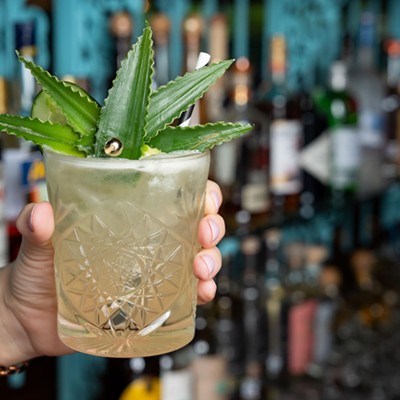Support Us
Houston's independent source of
local news and culture
account
- Welcome,
Insider - Login
- My Account
- My Newsletters
- Contribute
- Contact Us
- Sign out
[
{
"name": "Related Stories / Support Us Combo",
"component": "11591218",
"insertPoint": "4",
"requiredCountToDisplay": "4"
},{
"name": "Air - Billboard - Inline Content",
"component": "11591214",
"insertPoint": "2/3",
"requiredCountToDisplay": "7"
},{
"name": "R1 - Beta - Mobile Only",
"component": "12287027",
"insertPoint": "8",
"requiredCountToDisplay": "8"
},{
"name": "Air - MediumRectangle - Inline Content - Mobile Display Size 2",
"component": "11591215",
"insertPoint": "12",
"requiredCountToDisplay": "12"
},{
"name": "Air - MediumRectangle - Inline Content - Mobile Display Size 2",
"component": "11591215",
"insertPoint": "4th",
"startingPoint": "16",
"requiredCountToDisplay": "12"
}
,{
"name": "RevContent - In Article",
"component": "12527128",
"insertPoint": "3/5",
"requiredCountToDisplay": "5"
}
]
Chef Alberto Baffoni first made waves in Houston when he arrived to open Simposio. The classical Italian restaurant was well-received by diners and critics alike. A later effort, Sapori, was regrettably short-lived and he spent years working at various Houston restaurants.
Now, though, it seems he has a home at Mascalzone, the four-location chain founded by former Italian boxer (and longtime friend of Baffoni’s) Andrea Magi. Baffoni is in charge of the menus at both Houston locations. The first was in West Houston and the second opened on Shepherd between Washington and I-10.
Baffoni was born in Fano in the Marche region of Italy, an area of the central coast that is bordered by the Adriatic Sea. Like many chefs, he was raised by with family members who cooked. “Much of our food was made at home. My grandma had a little farm with rabbits and chickens—all sorts of small animals,” he related.
There was also produce grown on the farm, like tomatoes and grapes. His grandfather made wine. On Sundays, the family and their friends would get together for a grand meal. During holidays and celebrations, everyone would gather around the table to fill and wrap tortellini.
“I remember my mother would make gnocchi and piadina [an Italian bread akin to pita] and it was very fun,” reminisced Baffoni. His first summer job at age 15 was cleaning shrimp and shellfish at a trattoria. The following season, he worked at a pastry shop.
Tourism is big business in Fano, with lots of clubs and hotels, which makes for abundant prospects in the culinary industry. “It’s our daily bread,” says Baffoni. “It’s why I chose culinary school.”
He wasn’t entirely sure he wanted to be a chef by the time he attended culinary school in Pesaro, but by the time he was done, he knew he’d made the right decision. Working in hotels and starting to make some money with his skills inspired passion and convinced him he’d made the right choices.
His father bought him a small convection oven and while Baffoni was in school, he’d make bread and cakes for family and friends. One of his teachers was notable chef Lucio Pompili of Symposium Quattro Stagioni [Symposium Four Seasons], a seasonally-driven restaurant. Pompili would become his mentor.
He graduated in 1986 and finished his military service, which was mandatory for men in Italy until the law was changed in 2004.
Baffoni started to travel, which was something he’d always wanted to do.
He spent a few years in London, always working in Italian restaurants. The opportunity to go work in the Bahamas came up, so he spent a year-and-a-half in Freeport on the island of Grand Bahama. He fell in love with an American woman and that was what brought him to the United States. He moved to Washington D.C. where he found a job at respected, worldwide Italian chain BICE. (The D.C. location unfortunately closed in 2009.)
He worked for acclaimed chef Gianni Scappin there (who now has three restaurants in the Hudson River valley) and Baffoni regards that as a landmark in his career. “He really opened my eyes to what an Italian restaurant is in America,” he said. “I’d come straight from Europe and had different training and techniques.”
So, what are the differences in cooking in Italian restaurants versus American-Italian ones? Baffoni says, with no trace of derision, that American diners expect more service and need more care and attention. “It has to do with how Americans eat,” he explained. “Here, it needs to be faster. Americans are more refined on service and have to be attended more than Europeans. There’s more etiquette. A server really has to be on the case to give good service. In America, service is as important as food. Restaurants close from bad service if there is excellent food. That would never happen in Italy. There, they follow where good food is and service comes second.”
Europeans also don’t expect to be greeted and seated as quickly and linger longer over a meal. “In Italy,” says Baffoni, “People work a shift from 8 a.m. to 12, then there’s a break until 4 o’clock and then you work another four hours until 8. There’s a four-hour break. That doesn’t work here. You have an hour break and have to go back to work. That’s just the lifestyle. You can’t change that and it is what it is.”
Baffoni says that during his four years under chef Scappin, he developed a stronger work ethic and started to grow in his career. Baffoni was promoted from cook to sous chef and eventually became an executive chef.
A manager left BICE to open his own restaurant, Sesto Senso, and Baffoni followed him to be in charge of the kitchen there for four years. His opportunity to be a partner came up when someone from Sesto Senso wanted to open a restaurant in Houston.
Simposio opened in 1997. The partner left after a few months, so it was up to Baffoni to run the place on his own. Unfortunately, nothing in Baffoni’s background up to that point had given him experience in running the business side of a restaurant. He had to learn it all. Some of Simposio’s investors helped support him on this side of the endeavor.
Baffoni was grateful to be well-received by Houstonians at a time when there weren’t many great Italian restaurants. “I brought to Houston something that wasn’t here before. Now, Houston has evolved incredibly food-wise. I have a lot for all of the young chefs in town because there are some amazing things going on,” said Baffoni. Now, of course, with all of that young talent, Baffoni has more competition than he used to, but he’s realistic about it, simply saying, “You have to be up to the challenge.”
In 2005, Baffoni sold his interest to one of Simposio’s partners. He did some catering gigs for a time and then tried to open another restaurant, Sapori. His second restaurant in Houston was tragically short-lived, lasting only about eight months. “It was unfortunate,” he said. “I overestimated myself. I thought I’d get off to a faster start.”
To new restaurateurs, he advises they make sure they have enough capital in case business doesn’t pick up right away. That is, in fact a typical situation. “Be prepared to do nothing more than break even for a couple of years,” he advised.
After Sapori shuttered, he went back to Italy to visit his parents. Come back tomorrow for Part 2 of our Chef Chat to find out how Baffoni would pick up the pieces and someday find himself in charge of two Houston restaurant locations.
KEEP THE HOUSTON PRESS FREE...
Since we started the Houston Press, it has been defined as the free, independent voice of Houston, and we'd like to keep it that way. With local media under siege, it's more important than ever for us to rally support behind funding our local journalism. You can help by participating in our "I Support" program, allowing us to keep offering readers access to our incisive coverage of local news, food and culture with no paywalls.
Phaedra Cook
Contact:
Phaedra Cook
Trending Food & Drink
- Openings and Closings: Molihua Taking Reservations, Holey Moley Debuts Today
- Houston’s 5 Best Weekend Food Bets: A 4/20 Bake Sale and Fresh-Faced Farmers Market
- Upcoming Houston Food Events: JŪN Hosts a Pastry Pop-Up and Wine & Dine
-
Sponsored Content From: [%sponsoredBy%]
[%title%]

Don't Miss Out
SIGN UP for the latest
food & drink
news, free stuff and more!
Become a member to support the independent voice of Houston
and help keep the future of the Houston Press FREE
Use of this website constitutes acceptance of our
terms of use,
our cookies policy, and our
privacy policy
The Houston Press may earn a portion of sales from products & services purchased through links on our site from our
affiliate partners.
©2024
Houston Press, LP. All rights reserved.




